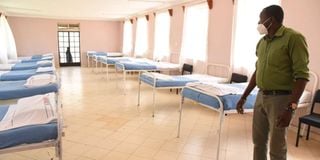Covid-19 responses gender-blind

What you need to know:
- Nakuru County Government recently converted Bondeni Maternity Hospital into an isolation centre, inconveniencing women from low income areas.
- County Health Executive Gichuki Kariuki later defended the move saying “the decision was well thought”.
- Cabinet Secretary for Public Service and Gender Prof Margaret Kobia says implementation of the anti-Covid-19 responses has been learning in progress and the government has done its best.
Just how has the National government and counties fared on gender responsiveness in the fight against Covid-19?
Nakuru County Government recently converted Bondeni Maternity Hospital into an isolation centre, inconveniencing women from low income areas Kivumbini, Lake View, Kwa Rhoda, Kaptembwa, Flamingo, Kaloleni and BondeniPPEs, Prof Margaret who have depended on the facility for more than 50 years.
County Health Executive Gichuki Kariuki later defended the move saying “the decision was well thought”.
In the meantime, he said, a standby ambulance had been placed at the hospital to rush women to the Margaret Kenyatta Mother Baby Wing at the Nakuru Level Five Hospital and the nearby Rhonda Maternity Hospital.
ESSENTIAL FACILITY
While, Nakuru County is taking away an essential facility important to lowering maternal and neonatal mortality rates, other counties are making steps towards the right direction.
In Mombasa, the county has special wards for quarantined women with infants at the 300 bed-capacity Technical University of Mombasa facility.
Mrs Mary Opiyo (identity hidden) is a beneficiary of the female-only quarantine cubicles.
“We had special rooms for mothers with their infants. I was the only woman with a young child and I felt so safe,” she said during an interview with Nation, adding that she has recovered from Covid-19.
Health chief officer Dr Khadija Shikely said women and children need special attention.
“We had a nine-month-old child and the mother at the facility who were both positive. We had to separate them from the rest,” said Dr Shikely.
SEPARATE QUARANTINE
In Embu, the county has established separate quarantine wards and ablution facilities for breastfeeding and pregnant mothers at Embu, Runyenjes, Siakago and Kiritiri isolation centres.
“We would like to ensure mothers are safe should there be admissions in those wards,” said Governor Martin Wambora.
At the national level, the government has made progress.
From addressing rise in sexual and gender-based violence (SGBV), buying female appropriate personal protective equipment (PPE), to rolling out the Sh3 billion credit guarantee scheme for revival of businesses affected during the Covid-19 period.
For instance, it is until President Uhuru Kenyatta directed National Crime Research Centre (NCRC) to probe the worrying prevalence of teenage pregnancies and SGBV that there seemed to be a sense of direction in tackling the social pandemic.
LEARNING IN PROGRESS
Mr Kenyatta directed the centre to study underlying causes leading to rise of SGBV cases and early pregnancies within 30 days and recommend remedial actions.
Cabinet Secretary for Public Service and Gender Prof Margaret Kobia rates the government’s gender responsiveness in the fight against Covid-19 at eight out of 10.
She says implementation of the anti-Covid-19 responses has been learning in progress and the government has done its best.
“Gender responsiveness is complex. It is after the implementation of the responses that perspectives of gender start emerging,” she said in a phone interview on August 7.
“For example, Gender Based Violence increased by almost 30 per cent globally…as a government, we have learnt that when designing the Covid-19 responses, we must bring the gender perspective,” she added.
In fact, she said, following the President’s directive on GBV and teenage pregnancies, the Cabinet agreed to form an inter-agency of six ministries to respond to GBV.
ADDRESS GBV
Interior and National Coordination, Public Service and Gender, Health, Labour and Social Protection, Information, Communication and Technology ministries are mandated with coming up with a work plan on how to address GBV.
The government was previously blind to the fact that PPEs fit men and women health workers differently.
That has changed and the government is now purchasing PPEs based on how fitting they are to each gender said Prof Kobia.
When the President announced the Sh3 billion credit guarantee scheme, the emphasis was laid out that the loans were to be given only if one met the bank’s credit regulations, which often locks out women.
Prof Kobia clarified that the government had entered into an agreement with designate banks including Absa and KCB to award the credit to women entrepreneurs without much constraints.
Development policy analyst Ms Magdalene Kariuki reckoned that although the government has made efforts, its gender responsiveness has not been comprehensive.
“Having a hotline is not enough. Consider that violence is primarily perpetuated at home and one has nowhere to go,” she said.
“That shows just how important it is to have a safe house and this is a conversation that has been going on for a long time.”
By Moraa Obiria, Winnie Atieno, George Munene and Eric Matara




